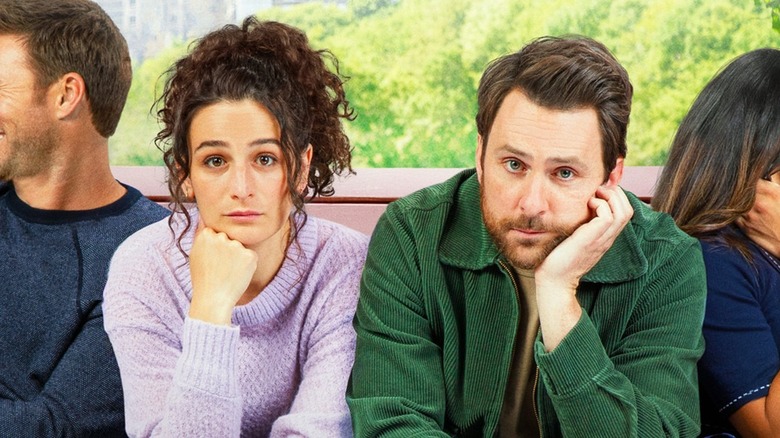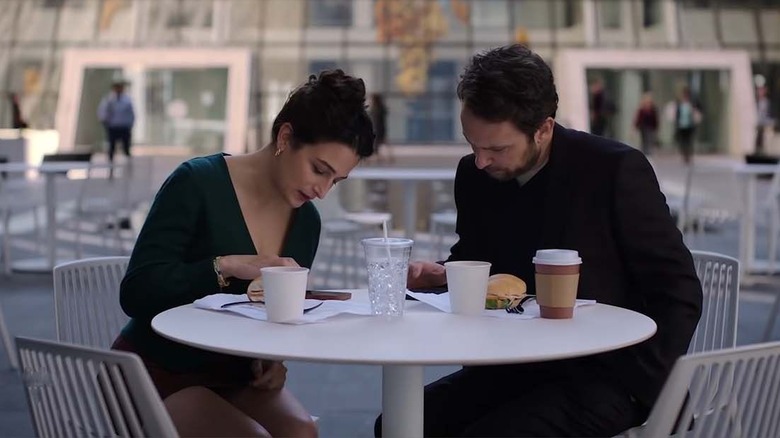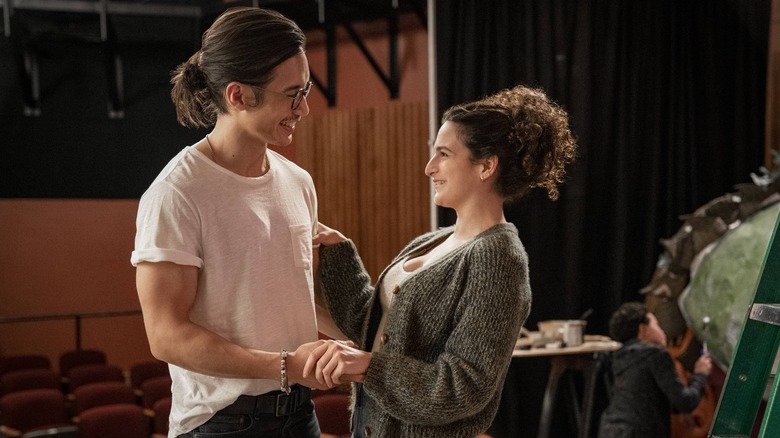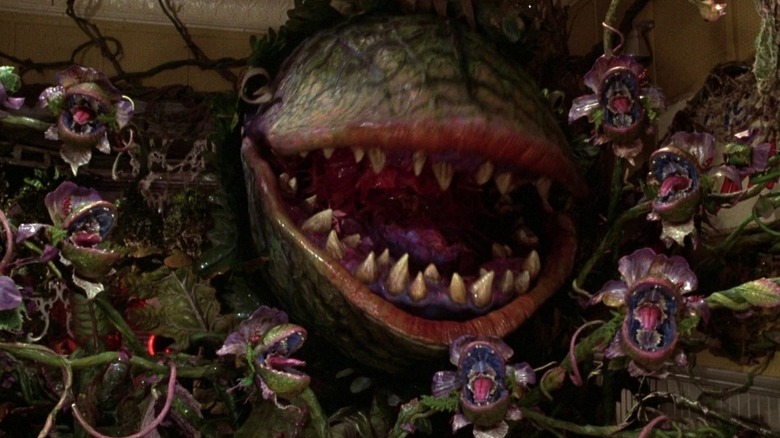I Want You Back Director Jason Orley On Rom-Com Staples And Securing The Rights To Little Shop Of Horrors [Interview]
Director Jason Orley ("Big Time Adolescence") wants audiences to root for everyone in "I Want You Back." It is not a romantic comedy about evil exes. It's about relationships that simply don't work out, in the end, for the better. Although Orley gets to go broad in the rom-com, the director doesn't paint with many broad strokes in his film, which stars Charlie Day and Jenny Slate.
For Orley, all the honesty was there on the page from the beginning, thanks to "This is Us" showrunners and "Love, Simon" writers Isaac Aptaker and Elizabeth Berger, who wrote this film's script. "What the writers do so well is, they had such empathy for all of their characters," Orley said. "But it was also tough that way, like, 'Okay, you're going to meet Scott Eastwood as he's breaking up with Jenny Slate, so how do you still like this guy after you meet him that way?' That was hard because you need the audience to root for his love and root for his relationship, too, to work."
In a recent interview about "I Want You Back," Orley talked to us about shooting comedy like drama and why getting the rights to "Little Shop of Horrors" was the biggest challenge before production began.
"How to not make this like it's a f**king Cialis commercial."
The more flawed these characters got, the more I liked them.
Yeah. That was important to make all six of them feel, it wasn't about, "They're my perfect, slow-mo walking ex that's like, 'How do I get them back?'" kind of movie. They were all in awkward, messy relationships, trying to figure sh*t out.
Were there any staples of the rom-com you wanted to lean into, though?
It's funny, there are things you come to expect, and I think that those are important because the genre is this comforting thing. You put it on because there are certain things you know you're going to get. And obviously, my job is to make those things feel fresh and pick and choose what I want to use and what I don't want to use.
I love breakups, honestly, in comedies. There's something funny about a character when they're sad, because it's relatable and you've been there. "Forgetting Sarah Marshall," I think, is the last really great rom-com. I can remember seeing it and [seeing Jason Segel's character] go through a breakup in the beginning, I loved that. And further back, there's that great Albert Brooks movie, "Modern Romance."
Great movie.
That amazing 20 minute sequence of him in his house, walking around, going through his Rolodex, calling exes. I'm just dying, watching this thing. That was something I talked to Charlie a lot about, because that movie opened with him breaking up with his girlfriend and then he goes through this thing. And obviously, one, you couldn't make that movie today because he has a 20 minute sequence of him just talking to himself. But I showed that to Charlie and I said, "There's something so funny about the sadness of these moments."
Did you ever hear Albert Brooks' story about meeting couples that got back together after seeing that movie?
No, that's incredible. They don't get it at all [Laughs]. That is an anti-love movie. Remember that scene with him in the car, where he picks the girl up on the date and they just drive and he starts crying listening to that Michael Jackson song and then he drops her back off? He's like, "I can't do this." Brilliant.
Aesthetics are always tricky with romantic comedies. You usually want something colorful, but sometimes, they can just be garish or flat. How'd you and your cinematographer want to make a visually appealing romantic comedy?
Okay, so Brian Burgoyne, who is an incredible DP, we talked a lot. Starting with some of those older movies, like "Annie Hall," like "Modern Romance," we talked about how to not make this like it's a f**king Cialis commercial. How to not make this feel super bright, overly lit, and feel real. He had shot "The Big Sick," which I thought he did a good job at making feel natural, textured, and rich. It's that balance of aspiration and authenticity that we were constantly talking about.
He also shot another film called "Other People," which was Chris Kelly's film with Molly Shannon. These are comedies, but they're so real. They're so lived in. I think the way he shoots the colors are so lived in, there's nothing overly saturated, overly bright. And that was something we talked a lot about, making this world feel timeless. The diner, the colors in the movie theater feel rich but really lived in and not jumping out the screen at you.
"Even if you're making a comedy, shoot a drama."
You directed the Netflix special for Pete Davidson. What'd you learn from that, in terms of how and when to cut around a joke?
Yeah, that's the thing. When you're shooting a comedy special, that's its own beast because the only thing that matters is the jokes. Whereas, with this movie, I'm shooting a drama and I want to make it as funny as possible. But at the end of the day, I have to make sure I'm telling the dramatic story or else the audience won't care about any of these characters and the jokes won't matter.
Pete is such a no-frills guy. He doesn't like all the coming out, waving and, "Ladies, gentlemen, Pete..." We're going to start this thing. You're hearing his voiceover, the Netflix presents, and he's in the middle of a story. That was the big conversation we had, which was, "Let's just get you right into the comedy and getting right into these stories," because he is such a no bullsh*t guy.
With the jokes, we could move really quickly from joke to joke and keep it really tight. I think it was a 45-minute comedy special. We were like, "Sh*t, it's supposed to be an hour." But we said, "Look, we don't want it to be long." So, anyway, it's just a different beast. But with this, my philosophy is always, "Even if you're making a comedy, shoot a drama. Get really funny actors, and even if the scene on the page is a comedy, still shoot it like a drama."
All my favorite romantic comedies, like "Annie Hall," Gordon Willis shot that thing. They weren't like, "What's the funniest place we could put the camera?" They were like, "No, these actors are funny. We can put the camera wherever the hell we want. I think we should make them look beautiful."
For example, the basket scene in this movie where Charlie's hiding in the basket. I think people have seen Charlie in "Horrible Bosses," which is this great comedy, but I want them to see this in a different way. So I didn't want to put the camera in the basket and see him going, "Oh." That's like a "Horrible Bosses" shot. I think we need to do this like a farce, where he walks in the room, he gets in the basket, and then Scott [Eastwood] walks in the room and it's all in one shot. It's natural. Even this super broad moment feels as believable as possible, if we shoot it without making the camera a character quirky.
When he is in the basket, there's definitely a line between stupid and malicious. How'd you make sure he just didn't come off like a total creep in that scene?
That balance was the hardest thing, because you've got these characters who you introduce them to and say, "These are relatable people. These are like your friends, they're going through a breakup. This is all relatable." And then, 20 minutes in, they hatch this insane plan. How do we make that feel as relatable as everything else? How do we sell their heartbreak so much that you buy that they would actually go through all this much? And then, as the classic hijinks ensue, how do we make that come from a place of character and how do we make it come from a place of some version of authenticity?
"They're never going to let you do that."
The idea of you, a director, directing a director making a middle school version of "Little Shop of Horrors" is very funny to me.
Totally. All the jokes about, "Oh, you're the director." I had never directed even a meta scene within a scene before. I never directed any kind of production where you got backstage and everything. Manny [Jacinto] is fantastic and he played it so well. You could easily go so over the top with it. There are definitely parts of me that relate to this guy, like, "Take me seriously, take me seriously." He's like, "I know I'm making a middle school production of 'Little Shop,' but take me seriously." I'm like, "Look, I know this is a romantic comedy, but I'd watch it. I think it's good. I think there's real heart here." So, I related to that a lot.
Was it complicated getting the rights?
Dude.
[Laughs] Was it that difficult?
You have no idea. It was f**king crazy. I think the actual play we were going to use changed five times, because I had no idea how hard it was. And then, there was one play I'm not going to name, but there was a huge mainstream play and musical. We asked for the rights and they were like, "No, this movie has too many adult sexual themes." And we were like, "This is crazy. Your musical is dark..." There were so many moments like that. I know Isaac and Elizabeth had to write a letter to even see Stephen Sondheim, R.I.P, about a musical he had written. Honestly, we were a week [away from] shooting without a musical.
"Little Shop" was amazing, and it was top of our list. We were waiting for months to hear back that we could do it. That was my biggest stress in prep: What musical are we going to get to the right to use? And the big thing was "Little Shop," they didn't have a sense of humor because that movie has such a sense of humor about itself. Alan Menken could see what we were doing and he was like, "Oh." He was awesome. He let us do it and let us make those jokes, like Jenny making that joke, "Seymour going inside you." We were hearing, "They're never going to let you do that." And we're like, "It's 'Little Shop of Horrors.' How could they not let us do racy jokes?"
"I Want You Back" is now streaming on Prime Video.



